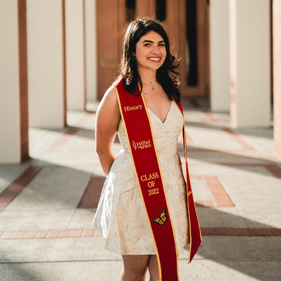This Year, In Person

I often think I have an average-sized family, but when I see everyone seated at their unassigned but basically assigned seats on Passover, I think twice. The table has gotten longer and longer each year. It ends up stretching from the living room to the entryway, as if trying to contain the ruach (Hebrew for “spirit”) that Passover brings out of each of us. Of course, it never can.
We go around the table, reading and singing in Hebrew and English from the iconic Maxwell House Haggadah. The pages are familiar. We learn about the four children: one wise, one wicked, one simple, and one who does not know how to ask. We sing classic songs, including “Echad Mi Yodea” (“Who Knows One?”) and “Chad Gadya” (“One Little Goat”).
Passover has always been our gateway to come together. A way to see how everyone has grown. At each seder, we’ve created moments that’ll be remembered for years to come, and we’ve asked questions beyond the Four Questions we know by heart. I’ve always adored these traditions.
But as I neared college, I knew that my seder was going to look different. At least temporarily. I needed to give myself space to find new Passover traditions with my Jewish community on campus.
Shortly after starting college at the University of Southern California, I found a Jewish home at Hillel. I spent Rosh Hashanah, Yom Kippur, Sukkot, and Hanukkah with new friends who became family. One of my favorite memories was carrying the Torah around the sanctuary on Rosh Hashanah. As 2020 rolled around, I was more than ready to experience my favorite holiday – Passover – with my Hillel community.
The pandemic put a wrench in those plans.
So, I turned to Zoom. Of course, a virtual Hillel seder could never replace an in-person experience. We sang all of the familiar songs, but they just felt wrong. Judaism is meant to be experienced with family — the one you’re born into and the one you create for yourself.
During the days that followed, USC Hillel found ways to infuse meaning into our Passover. The ritual committee created a student cookbook with family recipes so we could learn from one another and share new traditions. We did virtual “matzah breaks” in place of our normal “bagel breaks.” These creative efforts gave me community, but they also made me yearn for an in-person Passover even more.
So, I marked my calendar for 2021. When that fell through, I crossed my fingers for Passover 2022.
On Friday, I’ll finally have the opportunity to experience my first and last in-person Hillel seder. I think, in its own way, this will be a special moment. Hillel has been a pillar of my college experience. I imagine it’s the sort of place that makes Passover feel like a family affair.
As I celebrate my first and last seder on campus, I’m going to take it all in. I’ll walk the familiar route to Hillel and enter the building, decorated with string lights and USC memorabilia. There’ll be traditional and musical seders — the perfect blend of old and new.
Alongside my friends, I’ll gather around the seder table to ask questions and sing songs. The memories I’ll create with them will be remembered for years to come. I know it’ll be worth the wait.
Rachel Bernstein is a senior at University of Southern California.